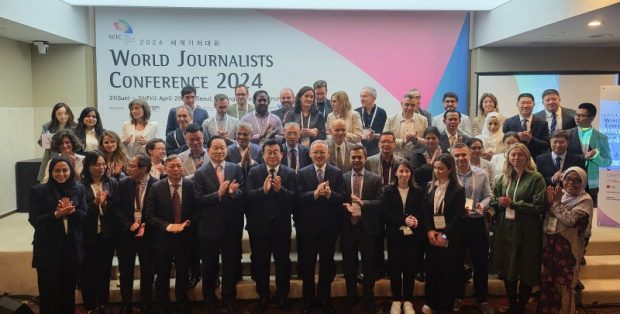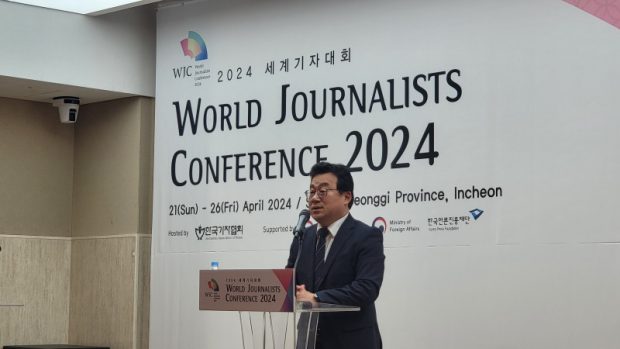
WJC 2024 opens amid renewed hope for brighter future for peace, AI journalism

SEOUL: The World Journalists Conference 2024 (WJC 2024) opened amid promises that it would serve “as a pivotal moment to deliberate on how journalism can extend its influence beyond reporting, towards facilitating an era of peace and security.”
“The Role of the Media in War Journalism and World Peace,” one of the two themes tackled by the conference this year, “aims to foster a sophisticated dialogue and will explore the media’s imperative endeavors to conclude warfare and pave the way for humanity’s safe and fulfilling existence, drawing upon the profound experiences of war correspondents,” Journalists Association of Korea (JAK) President Park Jong Hyun said at the opening of the event attended by 56 journalists from 46 countries, stretching from China to Chile.
The annual conference has been hosted by the Journalists Association of Korea since 2013.
The second theme at this year’s conference, “Navigating the Horizon: AI Journalism and the Future of Media”, is engaging the participants in “a profound contemplation on the future of journalism amidst the rapidly changing landscape brought forth by the advent of AI and technologies like ChatGPT,” Park said.
“It promises to be a thought-provoking discussion on how the media can adapt and thrive, ensuring its relevance and integrity in an era dominated by artificial intelligence.”
Park added that the two themes represent challenges that “we must introspectively examine and resolve.”
“Our unity is rooted in a shared commitment to journalism, transcending differences in nationality, gender, skin color, and ideology. We endeavor to report the truth with analytical clarity and empathetic insight, all in the relentless pursuit of freedom and peace. I firmly believe that your extensive discussions will illuminate the path towards a bright future for journalism,” he said.

The World Journalists Conference has been a regular feature and it was not interrupted by the Covid pandemic as it was held online, enabling journalists to interact visually.
“At the World Journalists Conference, discussions have spanned a wide array of topics, not limited to media issues but encompassing various themes vital for preparing for the future of our global community. Subjects broached have encompassed ‘Peace in the Korean Peninsula and the World,’ ‘The Development and Future of Journalism,’ ‘Climate and Environmental Issues and the Role of the Media,’ and ‘Preparations for the Post-COVID Era.’ the conference has made a profound contribution towards navigating the complexities and prospects awaiting the global village,” Park said.
The conference will offer participants the opportunity to explore South Korea’s rich traditional culture and the unique characteristics of each region, including visits to Seoul, Gyeonggi-do, Incheon, Suwon, Ansan, and the Demilitarized Zone (DMZ).
“This journey is expected to enrich your understanding of the Republic of Korea’s heritage and contemporary dynamics.
We earnestly hope that, amidst your demanding schedules, this World Journalists Conference will emerge as both a significant and advantageous experience for every participant,” Park said.
Established on August 17, 1964, the Journalists Association of Korea commemorates its 60th anniversary this year.
“It stands as the preeminent journalists’ consortium in the Republic of Korea, engaging over 12,000 members from 204 media establishments across newspapers, broadcast, telecommunications, and digital platforms,” Park stressed.
“Since its inception, the Journalists Association of Korea has acknowledged the significance of international exchange and incorporated the enhancement of ties with international journalists into its charter. “


